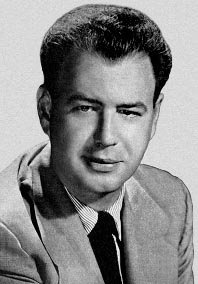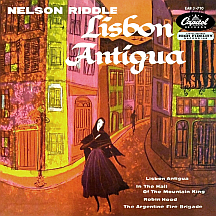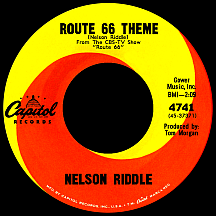NELSON RIDDLE
Lisbon Antigua
Major stars aren't always instantly recognizable. Take for example Nelson Riddle, an unassuming virtuoso who possessed a degree of star power, though more in name as opposed to the visual kind. While there were moments in which he was prominently featured, he nearly always worked behind the scenes; it would be difficult to imagine him taking a spotlight, "working a stage" in front of a packed audience, even as a conductor, solo trombonist or featured pianist. Yet he was as potent a force as any of the greats, navigating a lengthy career through highly successful phases as an arranger for luminaries like Nat "King" Cole, Frank Sinatra, Ella Fitzgerald and others, in addition to having two peak periods, several years apart, as a bona fide solo hitmaker. So while not necessarily identifiable to all music fans, he was recognizable for the distinctive sounds he created, ultimately impacting popular culture in a lasting way.
It was a good career choice for a kid from Oradell, New Jersey (a leisurely 30 minute drive from Manhattan) who was never really interested in anything other than music. His father had a small local band, prompting Nelson to follow in dad's footsteps; he studied piano and excelled as a trombone player during high school. In the early 1940s he had stints as a trombonist with several bands including Charlie Spivak's orchestra. In 1944, at age 23, he performed with Tommy Dorsey, who led one of the industry's most popular bands, and even wrote some arrangements that were used. He briefly served in the U.S. Army during the final months of World War II and was hired afterwards as an arranger for NBC radio. In 1950, Les Baxter hired him to do arrangements at Capitol Records. Nat Cole's chart-topping hits "Mona Lisa" and "Too Young" were arranged by Riddle despite their being credited to Baxter, but it was only the beginning; Nat and Nelson worked together often throughout the remainder of Cole's career. Some of the highlights were his arrangement of "Unforgettable" as well as the album St. Louis Blues (inspired by the film based on the life of W.C. Handy that starred Cole) and the Grammy-nominated Wild is Love.
When Frank Sinatra signed with Capitol in 1953, the goal was to get him out of his early-'50s slump and back into the forefront. Almost immediately he was teamed with Riddle, who arranged "I've Got the World on a String" and the vocal theme for From Here to Eternity, for which Sinatra won an Academy Award for Best Supporting Actor, happening as he was headed to number two on the charts with "Young-At-Heart," also arranged by Riddle. No surprise, then, that Nelson continued applying his expertise with Frank (in between projects with Nat) for years to come. Together they developed the notion of concept albums, such as In the Wee Small Hours and Songs for Swingin' Lovers! in 1955 and '56. Riddle began making his own instrumental recordings for Capitol, releasing singles of his versions of the "Martin Kane Theme" in 1953 and "(The Song from) The Caine Mutiny" in '54. Several attempts failed to connect...then he scored the biggest hit of his career.
A number of international melodies had become major hits by U.S. artists, including "Delicado" (a Brazilian song) by Percy Faith, "April in Portugal" by Les Baxter, "Skokiaan" (from Zimbabwe) by Ralph Marterie and "Cherry Pink and Apple Blossom White" (of Spanish-French origin) by Perez Prado. A Portuguese song, "Lisbon Antigua" (translation: "In Old Lisbon"), had been written in the early 1930s by Raúl Portela. Riddle's recording became his first to appear on the U.S. best seller charts, beginning a gradual climb in December '55, reaching the top ten in late January and number one in late February 1956 (a cover by Mitch Miller offered little competition). Ray Milland, on location directing the crime drama Lisbon (in which he also starred with Maureen O'Hara and Claude Rains), heard the song and decided to use it in his film; an instrumental version by Portuguese musicians as well as two female vocal recordings (one with Portuguese lyrics by Augusto Santos and Jose Galhardo, sung by Lisbon-born Anita Guerreiro, and an English version with lyrics by Harry Dupree, sung by American Roby Charmandy) were featured.
With a million-seller under his belt, Riddle enjoyed his peak year of hitmaking, reaching the top 40 two more times in '56: "Port Au Prince," a bouncy tune penned by Bernie Wayne ("There She Is," arguably his most famous song, had first been performed by Bert Parks at the Miss America Pageant the previous year) and the theme from western movie The Proud Ones (featuring an uncredited whistler), composed by Lionel Newman. Riddle made his own mark as a film composer that year with the theme from another western, Johnny Concho starring Sinatra, who released a vocal version of the song (titled "Wait For Me") with lyrics by Frank's pal Arnold "Dok" Stanford.

Riddle started receiving awards notice, beginning with one Emmy nomination for music scores each year between 1955 and 1958: a TV movie, Satins and Spurs starring Betty Hutton, a Producers' Showcase presentation of Our Town and two variety series: The Rosemary Clooney Show and The Frank Sinatra Show. Sinatra-Riddle LP collaborations continued with A Swingin' Affair! in '57 (and others) as well as two number one sellers, Frank Sinatra Sings for Only the Lonely in '58 and Nice 'n' Easy in 1960. Very busy guys...having loads of fun. So much that Nelson took it to the max, arranging albums by dozens of singers, notably Keely Smith and her signature song "I Wish You Love" in '58 and a long series of projects with Ella Fitzgerald including The George and Ira Gershwin Songbook in '59 and bookend 1962 releases Ella Swings Gently with Nelson and Ella Swings Brightly with Nelson. Judy Garland, Peggy Lee, Dean Martin, Anna Maria Alberghetti, Shirley Bassey, Bing Crosby, Oscar Peterson, Jack Jones, Eddie Fisher and even Bossa Nova specialist Antonio Carlos Jobim were among the artists who received Riddle's magic touch.
Throughout this time he continued putting out instrumental recordings for Capitol, some his own original compositions, others themes that he covered, yet none approached the sales or airplay highs of 1956. His first Grammy nominations came during the event's inaugural year covering 1958; he was a double winner right off the bat for Best Instrumental Composition and Best Musical Composition Over Five Minutes in Duration, both for his jazzy, Gershwin-esque "Cross Country Suite." Television themes became his forte in the early '60s; ABC-TV's The Untouchables (Robert Stack's famous turn as Eliot Ness) was a high-rated show with a sensational Grammy-nominated theme to match. But his signature tune from this period was the "Route 66 Theme," a song (with a killer piano hook) perfect for cruising the open road. The CBS series starring Martin Milner and George Maharis premiered in 1960; Riddle's single reached the mainstream top 30 (and was a top ten "Easy Listening" hit) in 1962, receiving two Grammy nominations in similar Instrumental categories (one for Theme, the other for Arrangement). He had further success with Billy May's "Naked City Theme" and kept the TV fun going with Dominic Frontiere's "Stoney Burke Theme" and Neal Hefti's music for ABC's 1966 blockbuster Batman, arranging the score week after two-episode week (slipping in some of his own songs, such as "Nelson's Riddler").
He picked up four more Emmy noms in '66 and '67, all for the Sinatra specials A Man and his Music. The quest for an Oscar for Best Music Score had begun in 1959 with Li'l Abner and a year later with Can-Can; the third and fourth attempts with Robin and the 7 Hoods and Paint Your Wagon led the way to a win on the fifth try for 1974's The Great Gatsby. By the time the opportunity to do the lavish string arrangements for Linda Ronstadt's What's New? album came along in 1983, he'd been retired a few years but immersed himself in the assignment anyway. An about-turn for Linda, who'd been demonstrating a versatility in recent years, the collection of romantic standards was a huge success and won him his third Grammy (for Instrumental Arrangement Accompanying Vocals). Two sequels followed (Lush Life and For Sentimental Reasons), the former gaining him a fourth Grammy, the latter completed without him due to his death during its sessions in 1985.
If one were to attempt to tabulate the sales, awards and numerous accolades Nelson Riddle racked up during his four-decade career, it would surely be a monumental task. Even if "Lisbon Antigua" had never been a number one smash, it wouldn't have mattered much. His body of work would still have guaranteed him a high position in the annals of 20th century music history.



